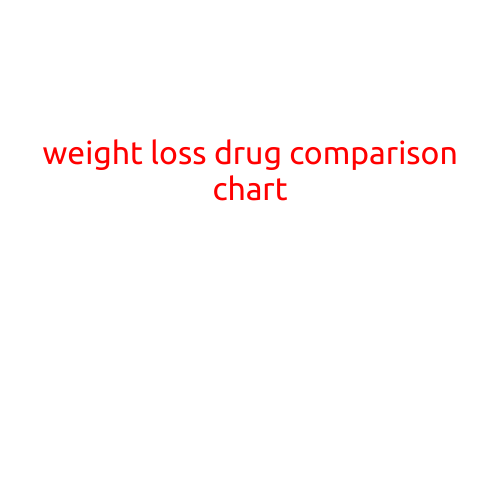
Weight Loss Drug Classification: Understanding the Different Types of Medications
Obesity is a growing public health concern worldwide, affecting millions of people and increasing the risk of various health problems, including diabetes, heart disease, and certain types of cancer. As a result, weight loss drugs have become an increasingly popular option for individuals struggling with weight loss.
However, not all weight loss drugs are created equal. In fact, they can be broadly categorized into several classes based on their mechanism of action, efficacy, and potential side effects. In this article, we will explore the different types of weight loss drugs and help you understand the characteristics of each classification.
1. Orlistat (Prescription-Based)
Orlistat is a prescription medication that works by decreasing the absorption of fat from food in the intestine. It is available in the form of a capsule or tablet and is typically taken three times a day with meals. As a result, orlistat can lead to significant weight loss in individuals who are overweight or obese. The most common side effects of orlistat include diarrhea, stomach cramps, and oily stools.
2. Phentermine (Prescription-Based)
Phentermine is a prescription medication that works by suppressing appetite and increasing the feeling of fullness. It is typically prescribed for short-term use and is often used in combination with other weight loss medications. Phentermine can lead to significant weight loss in individuals who are overweight or obese, but it may not be suitable for everyone, particularly those with certain medical conditions or those who are older or take certain medications.
3. Lorcaserin (Prescription-Based)
Lorcaserin is a prescription medication that works by activating certain receptors in the brain to increase feelings of fullness and reduce hunger. It is typically prescribed for people who are overweight or obese and has been shown to be effective in helping individuals lose 5-10% of their body weight. The most common side effects of lorcaserin include headache, nausea, and dizziness.
4. Bupropion (Prescription-Based)
Bupropion is a prescription medication that is commonly used to treat depression, but it has also been shown to be effective for weight loss. It works by increasing the levels of certain neurotransmitters in the brain that help regulate appetite and metabolism. Bupropion is typically taken in combination with other weight loss medications and has been shown to be effective in helping individuals lose 5-10% of their body weight.
5. Cannabinoid-Based (Over-the-Counter and Prescription-Based)
Cannabinoid-based weight loss medications work by activating the body’s natural cannabinoid receptors, which can help reduce appetite and increase feelings of fullness. These medications are available over-the-counter and by prescription and have been shown to be effective in helping individuals lose weight.
6. Fiber-Based (Over-the-Counter)
Fiber-based weight loss medications work by expanding in the stomach, making the person feel fuller for longer. These medications are available over-the-counter and have been shown to be effective in helping individuals lose weight.
7. Gln Tea Extract-Based (Over-the-Counter)
Gln tea extract-based weight loss medications work by increasing metabolism and reducing appetite. These medications are available over-the-counter and have been shown to be effective in helping individuals lose weight.
Important Considerations
It is essential to note that while weight loss drugs can be an effective tool for individuals struggling with weight loss, they should not be used as a substitute for a healthy diet and regular exercise. Additionally, weight loss drugs can have side effects, and it is crucial to discuss potential risks and benefits with a healthcare provider before starting any medication.
In conclusion, weight loss drugs can be classified into several types based on their mechanism of action, efficacy, and potential side effects. Understanding these classifications can help individuals make informed decisions about their weight loss journey. Always consult with a healthcare provider before starting any weight loss medication.





